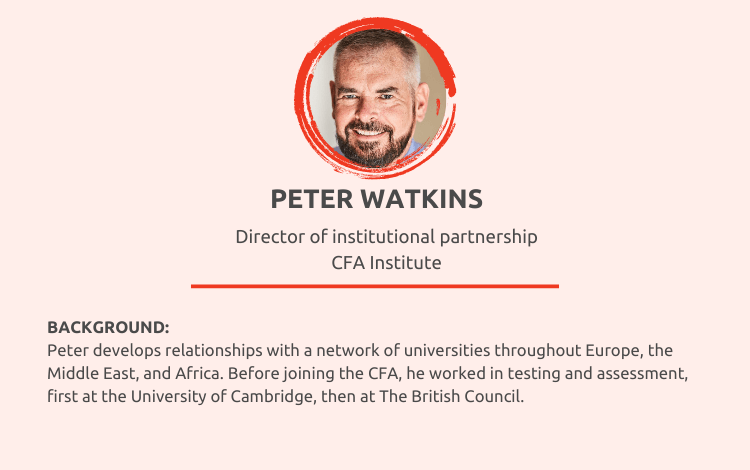A Master's in Finance coupled with success on the CFA Program really is the ultimate combination for those seeking career success in the investment profession.
A Masters degree demonstrates postgraduate academic achievement and the chance to focus on areas of personal interest. Many programs offer options or dissertation routes that allow students to take a deeper dive into topical, regional or specialists themes.
The CFA Program provides the all-important practitioner focus—the full breadth of skills and competencies employers are looking for in work-ready investment professionals.
CFA Charterholders are exceptionally career mobile and have considerable breadth of technical understanding outside their own job-roles. Importantly, the CFA Program is a standardised, globally-recognised credential so employers in any setting know the level of competence they can expect from professionals who have taken the CFA path.
Why combine the CFA with your Master's in Finance?
Many Masters students complete their academic study and then proceed to the CFA Program. Others begin or complete the CFA Program while working in finance and then go on to a related Masters.
This allows them to specialize on topics of interest that they’ve developed from professional experience. Some Masters degrees fully embed CFA Program content, with students completing their Masters and sitting for CFA Level I in the same year.
The key consideration: how impatient are you to complete the CFA Program and how much of your Masters year are you happy to spend on CFA study?
How do you find a combined program?
The CFA Institute University Affiliation Program specifically recognises schools with degrees showing significant alignment with CFA Program content.
Affiliation has become increasingly popular, with over 940 programs affiliated globally. This network is growing. The appeal is consistent with the trend throughout higher education of showing clear ties between academic and work-based knowledge.
Choosing an affiliated university course gives confidence to students that they are covering similar content and maximizing their chances of success on the CFA Program as a next step. It reassures students and employers that an affiliated degree has a strong basis in investment practice.
Can a CFA qualification support your Master's in Finance application?
CFA Program achievement will be advantageous in applying for a Masters in Finance program at most universities. Success on this famously rigorous professional program is a strong predictor of Masters program success.
If English is not your first language, professional credentials can also demonstrate your ability to study in the language.
Candidates who have passed one or more levels of the CFA Program may be granted an exemption from the requirement to submit GMAT or GRE test scores during the admissions process at many universities.
For example, applicants with CFA Level II may be offered this exemption when applying to London Business School (LBS) for their Masters in Finance program.
Other universities offer a waiver for credits, modules or sometimes exemption from the first year of study.
Many universities prefer to process admissions individually and may not publish specific waivers. We strongly recommend enquiring about this during any masters application.
It may help to refer to precedents at other universities and note that, to avoid duplication of prior learning, you consider your success with CFA as a good basis for a waiver.
The Masters in Finance program at LBS may provide a particularly good precedent, but the CFA Institute website lists more than 50 other waivers of this kind.
Read another Applicant Question:
MBA Vs Master's In Finance: Which Should I Combine With CFA?



